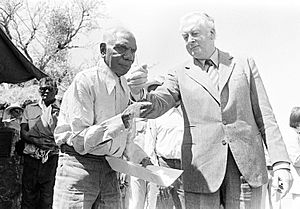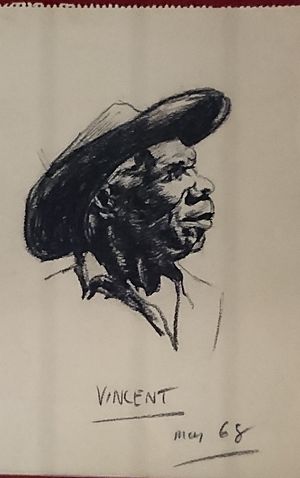Vincent Lingiari facts for kids
Vincent Lingiari AM (born 13 June 1908 – died 21 January 1988) was an Aboriginal rights activist from Australia. He was a member of the Gurindji people. When he was young, he worked as a stockman at Wave Hill Station. Aboriginal workers there were only paid with food, tobacco, and clothes. The station owners refused to improve their pay or working conditions. They also would not give back some of the Gurindji land. In August 1966, Lingiari was chosen to lead the workers. He led his people in the Wave Hill walk-off, also known as the Gurindji strike.
On 7 June 1976, Lingiari was given the title of Member of the Order of Australia. This was for his important work helping Aboriginal people. The story of Vincent Lingiari is celebrated in the song "From Little Things Big Things Grow". This song was written by Paul Kelly and Kev Carmody.
Contents
Early Life
Vincent Lingiari was born on 13 June 1908. As a young man, he became a stockman at Wave Hill Station. He was paid very little for his hard work.
He also played the didgeridoo, a traditional Aboriginal instrument.
The Wave Hill Walk-Off
Wave Hill Cattle Station is about 600 kilometers south of Darwin in the Northern Territory. From the late 1800s, a British company called Vesteys ran the station. Vesteys hired local Aboriginal people, the Gurindji, to work there. However, the working conditions were very poor. The wages were also much lower than what non-Indigenous workers received.
Why the Walk-Off Started
In 1966, Lingiari worked at Wave Hill. He had just returned from a time in hospital in Darwin. He led the Aboriginal workers at Wave Hill in a protest. They walked off the job because of the bad working conditions and low pay. People had complained about conditions at Wave Hill for many years. Even in the 1930s, an investigation criticized how Vesteys treated its workers.
The walk-off aimed to achieve more than just changes at Vesteys. Before 1968, it was against the law to pay Aboriginal workers more than a certain amount in goods and money. Also, money that should have gone to Aboriginal workers from the government often went to the cattle companies instead.
The Protest Begins
The protesters set up a camp at Wattie Creek (Daguragu). They demanded that some of their traditional lands be returned to them. Lingiari said, "We want to live on our land, our way." This was the start of an eight-year fight by the Gurindji people to get their land back.
In 1969, Lingiari helped write a song called "Gurindji Blues" with Ted Egan.
Winning Land Rights
The Wave Hill strike changed how Indigenous Australians and other Australians related to each other. It started as a protest about workers' rights. But it quickly became a big national issue when the Gurindji people demanded their traditional lands back.
The strike lasted for eight years. During that time, support for Aboriginal land rights grew stronger. The protest eventually led to the Aboriginal Land Rights (Northern Territory) Act 1976. This law allowed Aboriginal Australian and Torres Strait Islander people to apply for full ownership of their traditional lands in the Northern Territory. Importantly, it also gave them the right to talk about mining and building projects on those lands. They could also negotiate what kind of payment they would like.
The Handback Ceremony

A very important moment in Australian history happened in 1975. Prime Minister Gough Whitlam poured local sand into Lingiari's hands during an emotional ceremony. This was a symbolic way of giving a small part of the Wave Hill station land back to the Gurindji people. They received a 30-year pastoral lease. A famous photograph of this moment was taken by Mervyn Bishop. It was bought by the National Portrait Gallery and is shown in Old Parliament House.
On 7 June 1976, Lingiari was named a Member of the Order of Australia for his services to the Aboriginal people.
Vincent Lingiari's Legacy
Lingiari died on 21 January 1988. Every year until then, he attended the Gurindji’s yearly re-enactment of the walk-off.
Remembering a Leader
Vincent Lingiari was a respected leader of the Gurindji people. His fight for his people's rights made him a national hero. He achieved a huge success. This was one of the most important achievements in the history of recognizing Indigenous people's rights. He also helped other Australians understand the strong connection Aboriginal people have to their land.
A Song and a Place
One of Australia's largest areas represented by a politician is named after Lingiari. The Division of Lingiari covers almost all of the Northern Territory. It also includes Christmas Island and the Cocos Islands. This area includes Daguragu and the traditional Gurindji lands.
The story of Lingiari is celebrated in the song "From Little Things Big Things Grow". Paul Kelly and Indigenous musician Kev Carmody wrote it. Kelly recorded it in 1991. Later, it was added to the Sounds of Australia archive.
Irish folk musician Damien Dempsey also tells the story of Lingiari's part in the strike. His song "Wave Hill Walk Off" is on his 2016 album No Force on Earth.
 | John T. Biggers |
 | Thomas Blackshear |
 | Mark Bradford |
 | Beverly Buchanan |


